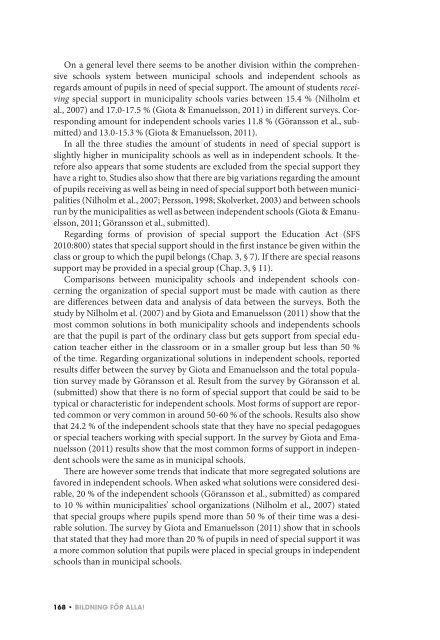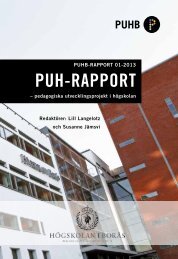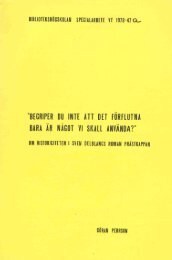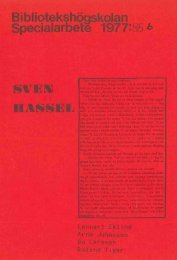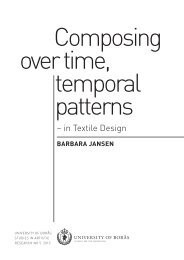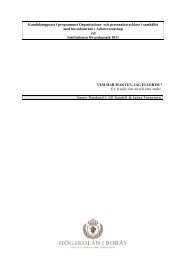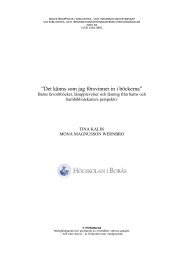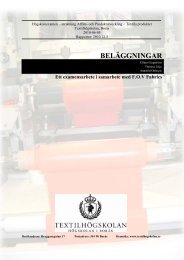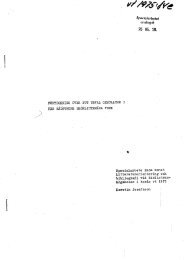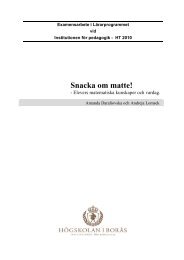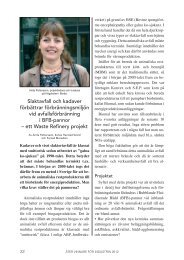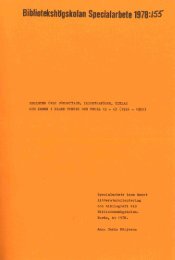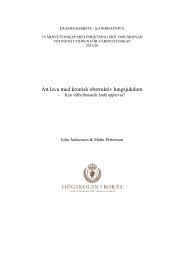Bildning för alla! - DiVA
Bildning för alla! - DiVA
Bildning för alla! - DiVA
Create successful ePaper yourself
Turn your PDF publications into a flip-book with our unique Google optimized e-Paper software.
On a general level there seems to be another division within the comprehensive<br />
schools system between municipal schools and independent schools as<br />
regards amount of pupils in need of special support. The amount of students receiving<br />
special support in municipality schools varies between 15.4 % (Nilholm et<br />
al., 2007) and 17.0-17.5 % (Giota & Emanuelsson, 2011) in different surveys. Corresponding<br />
amount for independent schools varies 11.8 % (Göransson et al., submitted)<br />
and 13.0-15.3 % (Giota & Emanuelsson, 2011).<br />
In all the three studies the amount of students in need of special support is<br />
slightly higher in municipality schools as well as in independent schools. It therefore<br />
also appears that some students are excluded from the special support they<br />
have a right to. Studies also show that there are big variations regarding the amount<br />
of pupils receiving as well as being in need of special support both between municipalities<br />
(Nilholm et al., 2007; Persson, 1998; Skolverket, 2003) and between schools<br />
run by the municipalities as well as between independent schools (Giota & Emanuelsson,<br />
2011; Göransson et al., submitted).<br />
Regarding forms of provision of special support the Education Act (SFS<br />
2010:800) states that special support should in the first instance be given within the<br />
class or group to which the pupil belongs (Chap. 3, § 7). If there are special reasons<br />
support may be provided in a special group (Chap. 3, § 11).<br />
Comparisons between municipality schools and independent schools concerning<br />
the organization of special support must be made with caution as there<br />
are differences between data and analysis of data between the surveys. Both the<br />
study by Nilholm et al. (2007) and by Giota and Emanuelsson (2011) show that the<br />
most common solutions in both municipality schools and independents schools<br />
are that the pupil is part of the ordinary class but gets support from special education<br />
teacher either in the classroom or in a smaller group but less than 50 %<br />
of the time. Regarding organizational solutions in independent schools, reported<br />
results differ between the survey by Giota and Emanuelsson and the total population<br />
survey made by Göransson et al. Result from the survey by Göransson et al.<br />
(submitted) show that there is no form of special support that could be said to be<br />
typical or characteristic for independent schools. Most forms of support are reported<br />
common or very common in around 50-60 % of the schools. Results also show<br />
that 24.2 % of the independent schools state that they have no special pedagogues<br />
or special teachers working with special support. In the survey by Giota and Emanuelsson<br />
(2011) results show that the most common forms of support in independent<br />
schools were the same as in municipal schools.<br />
There are however some trends that indicate that more segregated solutions are<br />
favored in independent schools. When asked what solutions were considered desirable,<br />
20 % of the independent schools (Göransson et al., submitted) as compared<br />
to 10 % within municipalities’ school organizations (Nilholm et al., 2007) stated<br />
that special groups where pupils spend more than 50 % of their time was a desirable<br />
solution. The survey by Giota and Emanuelsson (2011) show that in schools<br />
that stated that they had more than 20 % of pupils in need of special support it was<br />
a more common solution that pupils were placed in special groups in independent<br />
schools than in municipal schools.<br />
168 • BilDning fÖr AllA!


